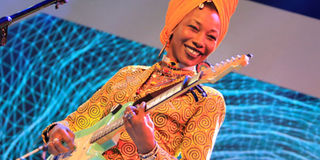Mali and Cuban singers combine to create unique sound with a message

Fatoumata Diawara performs at Uhuru Gardens on November 7, 2016. PHOTO | JEFF ANGOTE
What you need to know:
- Last Saturday night, Fatou, guitar in hand, resplendent in flowing orange fabric with dark designs and her trademark head wrap, began with a jazzed up version of Sowa, a song dedicated to children who grow up not knowing their parents, from her 2011 album Fatou.
- One of the powerful moments during the concert was during the song Mossou, with Fatou’s vocals accompanied only by Fonseca on piano. The song is critical of societies that force young girls into arranged marriages, often with their relatives.
- Clandestin (French word for illegal immigrant) speaks about the perils that Africans face while trying to make the journey to the Western world.
If it is true that jazz gets its rhythm from Africa, then a project that combines a Cuban ensemble with an African vocalist must surely be a musical match made in heaven. Last weekend’s Safaricom Jazz Lounge featured a stand out performance by pianist Roberto Fonseca leading his Quartet alongside the ‘sister from Mali,’ Fatoumata Diawara.
The collaboration was born when Fonseca began looking for African elements for his last album Jo.
“I was in Paris and his record company contacted me so we recorded the song 'Bibisa', which became very popular,” the Malian singer recalled in an exclusive interview the day before the concert at Uhuru Gardens, Nairobi. “It occurred to us that there was something special here so we released a live album two years later.” The album was titled At Home to reflect the emotional attachment that the Cubans feel for their roots in Africans.
The musicians have been touring for two years now and Fatou, as she is popularly known, describes the musical connections as purely African: “When we started to create songs together, I heard the Cubans play percussions and it sounded exactly like musicians playing the same instruments in my village in Mali.”
Last Saturday night, Fatou, guitar in hand, resplendent in flowing orange fabric with dark designs and her trademark head wrap, began with a jazzed up version of Sowa, a song dedicated to children who grow up not knowing their parents, from her 2011 album Fatou.
The song is inspired by her own experience. Born to Malian parents in the Cote d’Ivoire, Fatou was raised by her aunt in Bamako from the age of nine and didn’t see her parents again until she was 26.
While she was in Nairobi, she visited the Ghetto Classics, a project that has taken music education to children in the Korogocho slums and saw similarities with her own childhood. “When I was supposed to be married off to my cousin I chose music and that saved my future. Ghetto Classics is a wonderful model to transform the lives of young people,” she says.
One of the powerful moments during the concert was during the song Mossou, with Fatou’s vocals accompanied only by Fonseca on piano. The song is critical of societies that force young girls into arranged marriages, often with their relatives.
COUCHED IN LOVE
When she sings against Female Genital Mutilation in 'Boloko', it’s a pain that she can relate with. “For my generation, its too late because I was circumcised, but I wrote this song to give a chance to our daughters and save them from this practice.”
In her opinion, having many more African women role models, especially in music, can transform the lives of young girls. “How can an entire continent only produce a handful of international female stars like Miriam Makeba, Angelique Kidjo, and Oumou Sangare?” she asks
She adds: “There must be thousands of female singers in Africa who have so much to say and not only appearing in high heels saying ‘I am beautiful’ but addressing the real issues.”
Even though she sings about deep social and political issues, Fatou says the message is couched in love. “Some time people think love is just about romantic love, but that is too limited. I want to use my music to talk about the real subjects in Africa.”
Clandestin (French word for illegal immigrant) speaks about the perils that Africans face while trying to make the journey to the Western world.
“The more countries you go to, the more pages you can open in your book, more experiences,” she said. “However, African governments need to help their people to stay home.”
Fatou has lived in France for the last 15 years, which has been an opportunity to expand her traditional style and incorporate instruments like the piano to her music. “The Malian style uses the pentatonic scale and I have succeeded in adapting my voice to those instruments that are not used in our music without losing my identity.”
She cites her collaborations with the jazz great Herbie Hancock, British singer Damon Albarn and soul legend Bobby Womack as proof that Africans should remain true to their identity. “They always want me to sing in African language and that shows that we should be ourselves if we have to create an impression in the world of music. The world wants to hear our beautiful languages,” she says.
On stage, Fatou introduces a song dedicated to a man that she credits for giving Africans a great sense of identity: Nelson Mandela and in the middle of the song removes the head wrap as her beaded locks swirl in a frenzy of dance.
Finally, Fonseca and Fatou lead the crowd in singing along to the chorus of the song they first recorded together, Bibisa. The intersections of Malian and Cuban rhythms made this two-hour show a unique collaborative performance.




